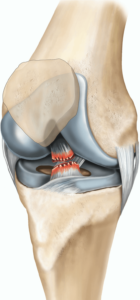ACL Ruptures
ACL ruptures have gained significant media attention of late due to the amount of time missed in sport, particularly among elite AFL, soccer and rugby players.
This blog will explore what an ACL is, how it is important for knee stability as well as explore the surgical and physiotherapy treatments for them.
 What is an ACL?
What is an ACL?
The knee joint does not have a large range of motion but instead possesses a high amount of stability to keep the joint together. The ACL is an important structure that stops the tibia bone of the lower leg from translating forwards away from the femur bone of the thigh. Whilst the knee typically has good stability the ACL can become torn or completely ruptured. This can occur during sport or from an incident usually involving twisting or pivoting motions, particularly while landing, or even from a blow to the outside of the knee.
Image source: https://www.healthdirect.gov.au
How do I know I injured my ACL?
- During this injury, you may hear a popping sound
- Feel a sense of instability in the knee
- Be unable to bear weight without pain
- Experience drastic swelling afterwards
What do I do now?
Once an injury has occurred immediately apply the P.O.L.I.C.E method (protection, optimal weight-bearing, ice, compression, elevation) protocols and seek help from a medical professional such as a physiotherapist. Our Hoppers Physio’s are experienced in sports physio treatments and therapies. We will assess your injury and recommend a recovery plan for you.
Depending on your goals, surgery is one option for you, the other is conservative management by getting the surrounding structures strong to compensate for the lack of ACL. For high agility demanding sports, an opinion for surgical reconstruction is often recommended. However, for those who do not need to return to a high velocity pivoting sport, physiotherapy can get you back to your normal gym and recreational sports. These options can be discussed with your physiotherapist in your consultations to make the best plan for you and your circumstances.
A physiotherapist can help regardless of the pathway chosen. Whether surgical reconstruction or conservative management a carefully designed program will be made to address your goals and return you to previous activities. These often start with strengthening, then progress to balance, running and return to more sport orientated/gym/recreation-based exercises.
If you want to book an appointment, please don’t hesitate to contact us at Hoppers Physio to start your rehabilitation journey!

